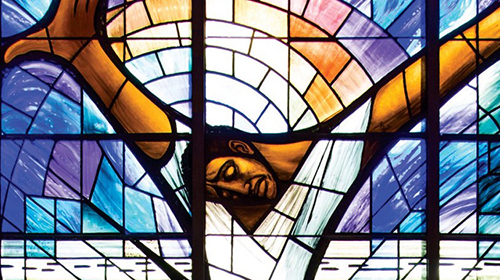



Have you ever had the opportunity to meet one of your heroes and then, after the interaction, felt like the whole thing just didn’t go well?
You build this thing up in your head, and you think the person will understand you because you’ve spent so much time in their books or listening to them talk. You assume that because you think you understand them, they’ll naturally understand you. Rarely does that work out. When it comes to it, you blurt out something ridiculous about how much they mean to you and the whole thing is over before it began. Awkward. And least that’s been my experience.
I’m happy to report that I have had the opposite experience with theologian Fleming Rutledge. Fleming is a priest in the Episcopal tradition who spent decades preaching and teaching on humanity’s most important topics. I’ve had the opportunity to meet her twice. I don’t expect her to remember me, but I can say that she made quite an impression. The first time I heard her preach was at the ordination of my friend, Jason Poling. Shortly thereafter, she was invited to give a seminar at St. Mary’s Ecumenical Institute alongside theological heavyweight Michael Gorman.
While both of those occasions offered enriching presentations, the thing that set them apart was the fact that in both instances, I was fortunate enough to get to hang out with her either before or after the official event. I’ve name-dropped enough already, but there was one particular occasion when I remember having drinks with her and no less than four other individuals whom I had profound respect for to say the least. I just kept thinking, “how the heck am I sitting at this table?”
The cool thing there is that I got to meet her before I was familiar with her work. The fact that I was able to spend time in a casual setting made me all the more interested in getting to know her life’s work.
Anyway, I didn’t know much about Fleming back then, but in recent years, I have noticed that her work has influenced some of my favorite voices in the modern-day church. Specifically, her masterpiece, The Crucifixion: Understanding the Death of Jesus Christ, as seemingly become required reading by those who seek to preach, in the 21 st century, Jesus Christ and Him crucified.
I have decided that for Lent, 2020, I will “blog” through Fleming Rutledge’s book. In the book’s Introduction, she claims that her “most important goals are to expand the discussion about what happened on the cross of Christ and to encourage the return of the subject to the center of Christian proclamation.” She also says that “the book is perhaps most particularly directed to busy pastors who are burdened with duties yet serious about preaching the gospel and seeking help for their sermons.” Sounds good to me.
Rutledge laments, in her opening pages, how often Christian traditions neglect a mature theology of the cross and therefore do not give it the attention it deserves. While I, by no means, wish to debate the importance of the cross in the life and theology of the church, I can honestly say that the reason why I wouldn’t debate that topic is because I have been blessed to sit under excellent teaching that has given the topic its’ just weight.
As a teenager, my pastor Sandy Mason taught us regularly to lay all at the foot of the cross. He taught us that Christ’s crucifixion was the pivotal moment of all human history. Sitting under Jason’s teaching, I learned that the cross was the climax of God’s covenant faithfulness to His people. The cross was how God accomplished his promise to Abraham that he would be blessed to be a blessing. And then in seminary, I learned from Dr. Gorman that the cross was not only an event of historic and sacrificial significance, it is the cruciform shape that the church is to take as it seeks to participate in the gospel and live out the Great Commission.
Rutledge says:
The story of salvation is not “beyond words.” The New Testament is from beginning to end a living witness to the apostolic preaching. The cross was meant to be preached. In every generation, the various theories will be examined again as more people come up against the question for themselves: What does Jesus’ death on the cross a long time ago have to do with us now?
She continues:
Christians do not simply look to the cross of Christ with prayerful reverence. We are set in motion by its power, energized by it, upheld by it, guaranteed by it, secured by it for the promised future because it is the power of the creating Word that “gives life to the dead and calls into existence the things that do not exist” (Rom. 4:17). Our labor is not only “not in vain” but also has eternal significance because it is being built into God’s future in ways that we presently see “through a glass, darkly,” but in the fullness of time, “face to face” (1 Cor. 13:12).
If Rutledge’s goal is to help pastors like me to develop of a strong theology of the cross that will follow the Spirit’s lead to reach the lost and mature disciples, I’m excited about this Lenten exercise to follow her lead and grow in my own understanding of this most important of topics. I fully recognize that this effort is primarily for me. While I hope that others will read it, and, indeed, read Rutledge’s book, my primary hope is that this exercise will make me a better preacher, one who is falling deeper in love with Jesus every day.
Ash Wednesday, 2020